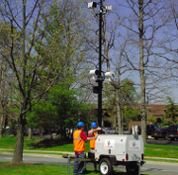Article from: www.thenewspaper.com/news/32/3258.asp
9/11/2010
Maryland, Australia, Spain: Traffic Cameras Beset With Accuracy Issues
Widespread complaints about speed camera accuracy in Maryland and Australia. Spanish cameras issue fines that are illegally high.
 Motorists in Maryland are outraged after receiving speed camera citations many believe to be wildly inaccurate. WJLA-TV reported complaints about cameras on Indian Head Highway in Forest Heights. The for-profit company that issues the tickets accused Earl Lomax of driving his 40,000 pound RV towing an automobile at 53 MPH uphill, a speed that it could not have reached in the short space available to accelerate before the camera. The Washington Examiner similarly reported that Optotraffic has been issuing tickets to buses in Prince George's County, including one accused of driving 78 MPH in a 35 zone on Bladensburg Road.
Motorists in Maryland are outraged after receiving speed camera citations many believe to be wildly inaccurate. WJLA-TV reported complaints about cameras on Indian Head Highway in Forest Heights. The for-profit company that issues the tickets accused Earl Lomax of driving his 40,000 pound RV towing an automobile at 53 MPH uphill, a speed that it could not have reached in the short space available to accelerate before the camera. The Washington Examiner similarly reported that Optotraffic has been issuing tickets to buses in Prince George's County, including one accused of driving 78 MPH in a 35 zone on Bladensburg Road.
The errors are reminiscent of the bogus speed camera tickets issued to bus drivers in New South Wales, Australia in 2005. Despite assertions from local officials about the accuracy of the cameras, independent testing ordered by the bus drivers' union proved conclusively that the heavy vehicles could not reach the speeds they were accused of traveling. Further research discovered that pavement sensors were confused by the vibrations of the heavy vehicles, producing the false readings. The town of Cheverly, Maryland responded to complaints about the inaccuracy of the Optotraffic laser speed detectors by posting a notice about how the Optotraffic unit tests itself and determines itself to be accurate. A Cheverly officer will also occasionally test the laser speed camera reading against a small police car using a handheld laser speed gun to prove the system is just fine.
On average, red light cameras and speed cameras in Adelaide, Australia go haywire twice a week, according to documents obtained by the Adelaide Advertiser newspaper. Over the course of two years, a total of 213 incidents of the devices breaking down -- sometimes photographing drivers who have done nothing wrong. Police officials insisted that they never allow a bogus fine to be issued, although they were unable to provide any guarantee.
In Spain, more than 100,000 illegally inflated photo radar citations have been issued since May 24, according to the European Motorists Association (AEA). Under the law, authorities must apply a four percent margin of error for fixed camera tickets and a seven percent margin to mobile camera tickets. Because Catalonia, the Basque government, Direccion General de Trafico (DGT), A Coruna, Alicante, Murcia, Valencia, Valladolid and Zaragoza ignored this requirement, the amount of fines in some cases were three times the legal amount. For example, someone accused of driving 155 km/h (96 MPH) in a 120 zone (75 MPH) would be fined for driving 34 km/h over the limit -- 300 euros (US $380) -- instead of 24 km/h taking into account the possibility of error, which runs 100 euros (US $126). The cities of Madrid, Barcelona, Bilbao, Cordoba and Malaga have corrected their practices.
 Motorists in Maryland are outraged after receiving speed camera citations many believe to be wildly inaccurate. WJLA-TV reported complaints about cameras on Indian Head Highway in Forest Heights. The for-profit company that issues the tickets accused Earl Lomax of driving his 40,000 pound RV towing an automobile at 53 MPH uphill, a speed that it could not have reached in the short space available to accelerate before the camera. The Washington Examiner similarly reported that Optotraffic has been issuing tickets to buses in Prince George's County, including one accused of driving 78 MPH in a 35 zone on Bladensburg Road.
Motorists in Maryland are outraged after receiving speed camera citations many believe to be wildly inaccurate. WJLA-TV reported complaints about cameras on Indian Head Highway in Forest Heights. The for-profit company that issues the tickets accused Earl Lomax of driving his 40,000 pound RV towing an automobile at 53 MPH uphill, a speed that it could not have reached in the short space available to accelerate before the camera. The Washington Examiner similarly reported that Optotraffic has been issuing tickets to buses in Prince George's County, including one accused of driving 78 MPH in a 35 zone on Bladensburg Road.